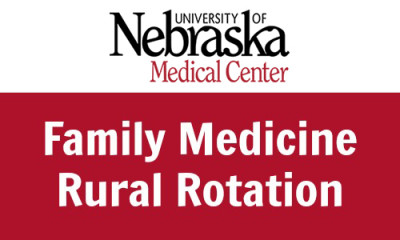Samantha Pilmaier, a third-year medical student from Elkhorn, started her Family Medicine rural rotation on August 31, 2015 in Holdrege, Nebraska at Family Medical Specialties.
After eight weeks in Holdrege, Samantha shared her experience about why the rotation was so beneficial to her education.
- What has been the most rewarding part of your experience?
The most rewarding part of my rural rotation was the wide variety of patients and diagnoses that I got to see. In addition, I really appreciated the hands on experience I received both in clinic and working in the ER. All of the providers were wonderful about allowing me to try different procedures and to try to come up with differentials and possible treatment plans. - What is the most the valuable thing you learned?
I spent a lot of time in clinic working on my history taking and physical exam skills. I probably learned the most about chronic conditions such as diabetes and hypertension, which will be helpful as a large number of patients have these conditions. - How has your perspective about medicine changed?
Most of the providers were on a more personal level with their patients than I have never seen before. Since these doctors have sometimes taken care of the patient since birth, they really know their patients well, including the medical as well as the psycho-social issues the patient may have. - Has your perspective about Family Medicine changed?
I was already strongly considering a career in Family Medicine before this rotation, and it continues to be one of my top choices. - Final thoughts?
Even though it was difficult to be away from my family and friends for an extended period of time, I’m glad UNMC’s Family Medicine rotation is set up as a rural experience. I got to see a lot more variety and be more hands on than I most likely would have if I stayed in Omaha. I grew a lot towards becoming a resident during this rotation.
The rural rotation experience is reserved for third-year medical students. Over an eight week period, students observe their preceptor in their medical, ethical, and community relationships.
